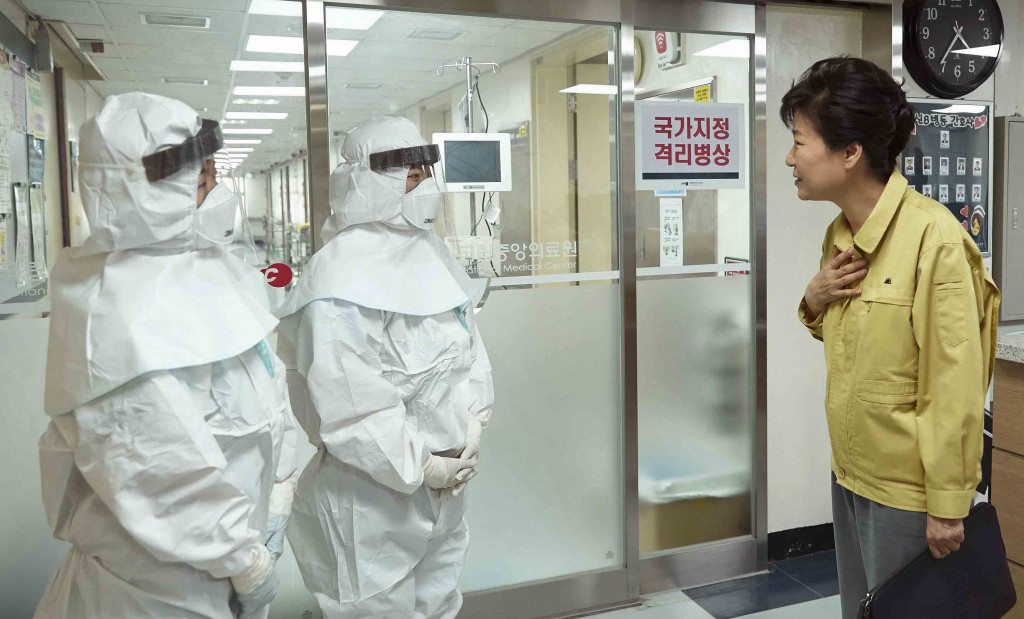- California Assembly OKs highest minimum wage in nation
- S. Korea unveils first graphic cigarette warnings
- US joins with South Korea, Japan in bid to deter North Korea
- LPGA golfer Chun In-gee finally back in action
- S. Korea won’t be top seed in final World Cup qualification round
- US men’s soccer misses 2nd straight Olympics
- US back on track in qualifying with 4-0 win over Guatemala
- High-intensity workout injuries spawn cottage industry
- CDC expands range of Zika mosquitoes into parts of Northeast
- Who knew? ‘The Walking Dead’ is helping families connect
President Park says utmost efforts under way to contain MERS

South Korean President Park Geun-hye, right, talks with health care workers wearing protective gears as she visits the National Medical Center housing MERS, Middle East Respiratory Syndrome, patients in Seoul, South Korea, June 5, 2015. Sales of surgical masks surge amid fears of the deadly, poorly understood virus. Airlines announce “intensified sanitizing operations.” More than 1,100 schools close and 1,600 people – and 17 camels in zoos – are quarantined. The current frenzy in South Korea over MERS brings to mind the other menacing diseases to hit Asia over the last decade – SARS, which killed hundreds, and bird flu. (Yonhap)
SEOUL, June 5 (Yonhap) — President Park Geun-hye on Friday urged people suspected of being infected with MERS to remain in self-quarantine, saying the government is making its utmost efforts to contain the disease.
“The top priority is to stop the spread of the infection of the Middle East Respiratory Syndrome,” Park said in a meeting with health care workers at the National Medical Center in Seoul.
The visit underscored the urgency in combating the virus that has killed four South Koreans and sparked a widespread public scare across the country.
She said quarantine is the most important measure to contain the deadly respiratory disease.
Medical experts said the disease does not spread through the air and is contagious only when people come into close contact with infected patients.
Police said suspected patients will be forcibly quarantined at hospitals if they defy house quarantine, a move that underscored South Korea’s determination to halt the spread of the virus.
South Korea has been on high alert against the disease since its first patient was reported on May 20. So far, 42 South Koreans have tested positive for MERS, of whom four died. As a preventive measure, more than 1,600 others remain under quarantine.
Park also called on government officials and medical staff to mobilize all resources available to contain the virus and to ensure that infected patients can recover.
“MERS is not an illness that cannot be cured,” Park said after hearing that three patients were preparing to leave the National Medical Center, a state-designated hospital for infected patients.
She also sought to allay public concerns over the MERS virus, noting that the virus will not spread outside state-designated hospitals as patients are treated in a specialized facility.
A widespread public scare over the disease showed no signs of abating, though medical experts said the public anxiety is not warranted.
Park admitted that the government made a poor initial response to the MERS virus, but she appealed to the people to “have confidence in the government that it is making the utmost efforts to stop the spread of the disease by mobilizing every possible resources.”
Medical experts have said it does not make sense for schools to cancel classes.
Still, more than 1,310 schools had canceled classes across the country as a precaution as of 3 p.m. The vast majority of the total, 838 schools, are in Gyeonggi Province, where the first case of MERS in South Korea was reported, according to the Ministry of Education.
Park also called for close cooperation with local authorities to effectively contain the disease, a comment widely seen as a thinly veiled accusation against Seoul Mayor Park Won-soon, who said late Thursday that a Seoul doctor came into contact with more than 1,000 citizens before he was confirmed as a MERS patient.
MERS is a viral respiratory illness that is new to humans, according to the U.S. Centers for Disease Control. It was first reported in Saudi Arabia in 2012 and has since spread to several other countries.
There currently is no vaccine or treatment for the disease.
Most people infected with MERS develop severe acute respiratory illness, including fever, cough and shortness of breath. Many of them have died.















